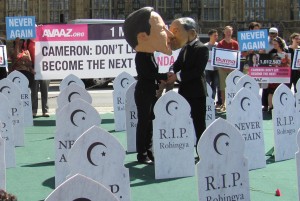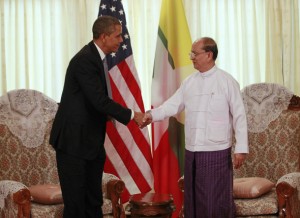Posts Tagged ‘Sanctions’ (104 found)
Burma: US Should Update Blacklist
The United States government should ensure that remaining sanctions on Burma are kept up-to-date on human rights abusers, Human Rights Watch and 36 other organizations said today in a joint letter to President Barack Obama. The Obama administration should move quickly to revise the Treasury […]
• • •EU Restoration of Myanmar Preferential Trade Regime: Neglect of Human Rights Concerns?
On 19 July 2013, the European Union brought Myanmar back into the so-called “Everything but Arms” regime, a preferential trade regime within the “Generalised Scheme of Preferences”. Although the EU claims this decision will facilitate the country’s path to democracy and development, it has been strongly criticised by numerous human rights organisations […]
• • •Statement by Deputy National Security Advisor for Strategic Communications Ben Rhodes on the Expiration of the Ban on Imports from Burma
Today, in light of the July 28 expiration of the Burmese Freedom and Democracy Act’s (BFDA) ban on imports from Burma, the President issued an Executive Order that repeals the provisions of Executive Order 13310 that implemented the broad BFDA import ban on products of Burma […]
• • •Thein Sein’s Words Must be Followed by Action
 President Thein Sein completed his first visit to the UK and France on 18 July with more promises of reform and was prematurely rewarded with trade and investment discussions, military cooperation and a gloss of legitimacy. Although Prime Minister David Cameron, President François Hollande, as well President Thein Sein, paid lip-service to reform and human rights, this does not disguise the reality of a dire human rights situation, the stalled peace process, and the empty promises of reform that characterize Burma today.
President Thein Sein completed his first visit to the UK and France on 18 July with more promises of reform and was prematurely rewarded with trade and investment discussions, military cooperation and a gloss of legitimacy. Although Prime Minister David Cameron, President François Hollande, as well President Thein Sein, paid lip-service to reform and human rights, this does not disguise the reality of a dire human rights situation, the stalled peace process, and the empty promises of reform that characterize Burma today.
One of the promises that Thein Sein made was that all political prisoners would be released by the end of the year. It has been over two years since Thein Sein assumed the office of President, and the amount of times that world leaders have pushed him on this issue has been countless. Yet there remain hundreds of people languishing in jail for their political activism, while the number of new political prisoners is increasing. On the very day that Thein Sein made this statement, a 74 year-old Rohingya human rights activist in Arakan State was arbitrarily arrested and detained. Just a few days later on 18 July, Daw Bawk Ja, a Kachin human rights activist and member of the National Democratic Force, was unlawfully detained on politically motivated charges […]
• • •Conflicting Realities: Reform, Repression and Human Rights in Burma
This report by the Subcommittee on International Human Rights is intended to recognize the important achievements brought about as part of Burma’s reform process, in particular the election of Daw Aung San Suu Kyi and other candidates from the NLD as Members of Parliament (MP) this April. At the same time, we wish to warn against hasty or irresponsible optimism and to sound the alarm about the lack of civilian control over the Burmese military, which has very serious human rights and humanitarian consequences. Recent progress has not yet extended to all parts of the country, nor to all of the people of Burma. Going forward, we believe that it is important for the international community to look beyond central Burma in assessing the depth and sincerity of the country’s reforms. Respect by the Burmese government and military for human rights and international law in Burma’s ethnic minority
areas will be the real measure of change in the country and should inform any decision regarding the permanent removal of sanctions by Canada […]
President Thein Sein’s US Visit Branded by Broken Promises
 For the first time in nearly fifty years, President Thein Sein will visit the United States and meet with President Barack Obama today, 20 May. This follows the historic visit by President Obama to Burma six months ago. The visit is an opportunity for the White House to pressure Thein Sein to continue the reforms that have been taking place and highlight some of the concerns the United States, the international community and particularly the citizens of Burma have. The visit also represents the more troubling view that there has been a relaxing of the US policy of rewarding positive reforms with increased engagement and that there is more interest in the economic and geo-political benefits of the relationship than addressing and solving the very large problems that the people of Burma are facing inside their country today.
For the first time in nearly fifty years, President Thein Sein will visit the United States and meet with President Barack Obama today, 20 May. This follows the historic visit by President Obama to Burma six months ago. The visit is an opportunity for the White House to pressure Thein Sein to continue the reforms that have been taking place and highlight some of the concerns the United States, the international community and particularly the citizens of Burma have. The visit also represents the more troubling view that there has been a relaxing of the US policy of rewarding positive reforms with increased engagement and that there is more interest in the economic and geo-political benefits of the relationship than addressing and solving the very large problems that the people of Burma are facing inside their country today.
When President Obama visited Burma, Thein Sein made a series of pledges; he agreed to create a commission to review political prisoner cases with the aim of releasing all political prisoners from custody, to allow the office of the United Nations High Commissioner for Human Rights to open an office in the country, to adequately address religious violence, more specifically to hold those guilty of violence against Rohingya people accountable and address resettlement and citizenship issues, and finally to allow humanitarian organizations access to conflict areas […]
Congressman Crowley Introduces Measure to Renew Sanctions on Burma, With Focus on Gem Imports
Today, Rep. Joe Crowley (D-Queens, the Bronx) introduced the renewal of the Burmese Freedom and Democracy Act, legislation that continues the ban on imports from Burma, particularly gems. “I remain very concerned about human rights violations in Burma, including violence against ethnic nationalities, the use of rape as a weapon of war […]
• • •Lifting EU Sanctions Will Unlikely Lead to an Improved Human Rights Situation in Burma
The International Federation for Human Rights (FIDH) and its member organization Altsean-Burma regret that the European Union (EU) has discarded its own benchmarks for reform in order to dismantle sanctions against Burma/Myanmar.
The disposal of this important and legitimate instrument to push forward positive change in the country is inconsistent, as mass atrocities continue in Kachin state and targeted violence endangers Rohingya and other Muslims in the western and central regions. In addition to undermining its own credibility, the EU decision threatens to decelerate the pace of reforms and prolong a state of impunity in Burma/Myanmar […]
• • •CSW Urges European Union to Prioritise Human Rights in Burma, Despite Lifting Sanctions
Christian Solidarity Worldwide (CSW) today urged the European Union (EU) to ensure that continuing grave violations of human rights, including religious freedom, in Burma, remain a priority, despite the decision yesterday to lift all EU sanctions on Burma apart from the arms embargo […]
• • •EU: Ending Sanctions Undercuts Burma’s Rights Progress
Pressure Still Needed to Protect Rohingya and Minorities, Release Political Prisoners
The European Union’s premature lifting of all targeted sanctions on Burma means the EU will need a new platform to press the government to improve the country’s still dire human rights situation, Human Rights Watch said today. On April 22, 2013, EU foreign ministers ended decades of EU travel bans and targeted sanctions on Burmese army and government individuals and entities, except its export ban on arms […]
• • •








 All posts
All posts